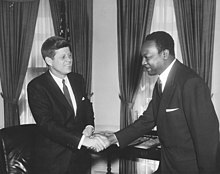Issoufou Saïdou Djermakoye
Issoufou Saïdou Djermakoye (born July 10, 1920 in Dosso , French West Africa , † June 13, 2000 in Paris ) was a Nigerien politician and diplomat .
Life
Issoufou Saïdou Djermakoye was a nephew of Abdou Aoûta Djermakoye, the traditional ruler of Dosso with the title of Djermakoye, who ruled from 1902 to 1913. He first attended schools in Algiers and Paris . From 1939 he served in the French armed forces and took part in the Battle of France in 1940. He then continued his education at the Paris Lycée Saint-Louis and in 1943 was the first high school graduate from Niger at this school.
Saïdou Djermakoye was a founding member and the first president of the Central Committee of the Nigerien Progressive Party (PPN-RDA). He headed his party's delegation to the founding assembly of the African Democratic Collection (RDA), which took place in Bamako in 1946 . In 1947 Saïdou Djermakoye was elected council member of the Union française , which he remained until its dissolution in 1958. In 1948 he helped found a new party, the Union of Independent Nigerians and Sympathizers (UNIS). In the elections to the Territorial Assembly in 1952 , he was elected a member of the Dosso County and had a seat in the Grand Conseil of French West Africa . A year later he left UNIS, was first a founding member of the Nigerien Progressive Union (UPN) and then a member of the Nigerien Action Block (BNA), which in 1956 joined the Nigerien Democratic Union (UDN) from Djibo Bakary to the Nigerien section of the African Socialist Movement (MSA) merged. The renewed election to the Territorial Assembly in 1957 lost Saïdou Djermakoye, but he was elected to the French Senate on June 8, 1958 . There he was involved in the Commission for Foreign Affairs, Defense and Armed Forces. Contrary to the party line, he was a supporter of the Nigerien autonomy referendum of September 28, 1958 and subsequently became a member of the Nigerien Progress Party again, for which he was elected as a member of the Nigerien Territorial Assembly elections in 1958 .
Less than a week later, Prime Minister Hamani Diori appointed him deputy chairman of the Council of Ministers. His mandate as French Senator ended on June 15, 1959. Hamani Diori appointed him to the government on April 2, 1959 as Minister of Justice . On December 31, 1960, Saïdou Djermakoye instead took on the role of Minister assigned to the Presidential Chancellery, from August 11, 1962, with the addition of responsibility for international cooperation. From June 25, 1963 to November 23, 1965 he was again Minister of Justice and then left the government. His successor as Minister of Justice was Mahamane Dan Dobi .
Issoufou Saïdou Djermakoye then embarked on a diplomatic career. He was Niger's Ambassador to the United States and headed the Permanent Mission of his country to the United Nations in New York City . From 1967 to 1982 he worked under the General Secretaries U Thant and Kurt Waldheim as a functionary for the United Nations, including as Undersecretary of the UN Trusteeship Council .
In 1982 Saïdou Djermakoye initially retired until he became the 18th Djermakoye of Dosso in 1998 at an advanced age. He held this until his death. He was buried in the Djermakoye palace in Dosso.
Honors
- Croix de guerre 1939-1945
- Knight of the Order of the Black Star of Benin
- Officer of the National Order of Niger
- Commander of the Legion of Honor
- Knight of the Ordre royal du Million d'Éléphants et du Parasol blanc
- Commander of the Order of the Comoros
- Commander of the Order of Upper Volta
- Commander of the National Order of Senegal
literature
- Philippe Decraene: Que sont-ils devenus? Issoufou Saïdou Djermakoye . In: Jeune Afrique . No. 1893 , April 16, 1997, p. 24-26 .
Individual evidence
- ↑ a b c Issoufou Saïdou Djermakoye on the website of the French Senate, accessed on May 9, 2012.
- ^ A b c André Salifou: Biographie politique de Hamani Diori. Premier President de la République du Niger . Karthala, Paris 2010, ISBN 978-2-8111-0202-9 , pp. 299-300.
| personal data | |
|---|---|
| SURNAME | Saïdou Djermakoye, Issoufou |
| BRIEF DESCRIPTION | Nigerien politician and diplomat |
| DATE OF BIRTH | July 10, 1920 |
| PLACE OF BIRTH | Dosso , French West Africa |
| DATE OF DEATH | June 13, 2000 |
| Place of death | Paris |
